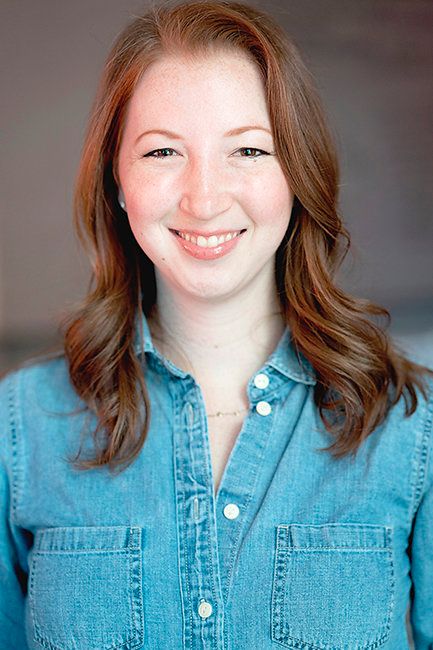Thank You 10 – Featuring: Rachel Reiss
Thank You, 10 is an interview series brought to you by Audition Cat, an upcoming app with career management tools for the professional auditioning performer. Each article interviews an industry professional with a different experience and opinion about what the future of auditioning looks like. Through these conversations, we hope an image will appear about what’s next for the industry, and what it aspires to be. Have someone you’d like to be considered for an interview? Reach out to us Facebook, Twitter, or Instagram.
Rachel Reiss, CSA

Pronouns: She/Her
Occupation: Senior Casting Director at Liz Lewis Casting Partners, Secretary of CSA’s New York Board of Governors and chair of the CSA Tech Committee
Links to Rachel’s work:
Credits:
2019 Heller Award Winner for Best Northeast Voice Over and Commercial Casting
(Most recent) King of Knives, Painter
Getting to Know You
Who are you? What’s your artistic background / what started your journey into the arts?
My name is Rachel Reiss and I’m a Senior Casting director at Liz Lewis Casting Partners, on the NY Board of Governors for the Casting Society of America, and Chair of the CSA Tech Committee. I was a total theater kid growing up. I attended a performing arts school and saw as many Broadway shows as I could. Though growing up with parents who were lawyers, I always had a logical side of my brain that wanted to put the pieces together behind the scenes. I realized during high school that I found more gratification in being a part of putting the full production together than just being on stage.
When did you set out on your current career path?
I fell into casting very early. I was home for the summer after my freshman year of college and was looking through all of my favorite Playbills. I kept seeing the same company listed under casting. This was before casting was a known career (before the American Idol days). So not knowing much about what casting was, I called the office, asked if they needed help for the summer, interviewed the next day, and started interning the following day. I spent time exploring other professions in entertainment, but knew pretty quickly that I had already found the career for me.
What is your “mission statement” as an arts professional? What drives you to continue in this industry?
I love bringing a creative’s vision to life. Members of a production have different ideas of how they see the final product. So I love materializing that while mediating those different ideas.
Within your artistic profession, what other industry roles do you work with most closely?
I love bringing a creative’s vision to life. Members of a production have different ideas of how they see the final product. So I love materializing that while mediating those different ideas.
What do you wish was more widely understood about your profession?
I’ve found that many don’t understand the role of casting. Our job is to find the best talent for a project regardless of where that person comes from. We do not represent talent (at least in the major markets) and we don’t benefit financially from talent. And most importantly, we genuinely want all talent to succeed. The better the talent looks, the better we look. So we are rooting for every single actor that auditions for us. We are the middleman between talent and production, so we are advocating for both sides of the production.
Auditions and You
In your experience, what is the most common pitfall that actors make with auditions?
I think the audition is built up to be a high stakes scary one-shot only event. But I encourage actors to try to reframe that perspective. You love to act, that is why you are an actor. In an audition, you get to act, play, and be directed by someone who really wants you to succeed. And if you are not right for one project, we will keep you in mind for another. Actors who are less fearful in the audition room, are more likely to be the ones who keep getting called in.
Let’s talk about self-tapes! Self-tapes have become more and more common for auditioning actors, even more so during the pandemic. What do you like about self-tapes? What do you dislike about them?
I love that I can now see actors from all over the world. While I did this beforehand, quarantine has scattered everyone and made “local” artists more accessible. I am personally not a risk taker, so the idea that actors had to take a huge financial risk to move to NY or LA to be considered for a role pulled at my heartstrings. But now with self-tapes, there are fewer barriers to entry. I also love that it encourages talent to do multiple takes and watch their work. That is a wonderful way to learn and improve your craft. Though I hate that actors are now being asked to not just act, but produce, light, sound design, set design, etc. etc. As casting, we want you to focus on what you do best – act.
As self-tapes become more and more prevalent in the industry, for your profession, what are the main differences between in-person and virtual auditions? What advice do you have for actors who have less experience with virtual auditions?
Hard wire in your Internet!! Even if your Wi-Fi is good, it will most likely fail when you need it most. This gives you another level of security. The main difference between in-person and virtual casting is the chemistry. You will never be able to match the relationship building and chemistry you feel in the same room whether that is with casting, other actors, or with the production team. That is one of the greatest joys of casting, and why I love it so much. So I don’t think in-person will go away for that reason. But in the meantime, you don’t have to worry about gas, parking, subway, etc.
If there was one piece of advice you’d give to any actor right before an audition or recording a self-tape, what would it be?
HAVE FUN! We want you to be the best person we’ve seen all day. Truly.
How do you expand your “network”? When you interact with a performer for the first time, what inspires you, and what are you looking for in this initial interaction/audition to convince you to bring them back?
These both may sound redundant, but I’m looking for actors who are excited to be there, and approach the audition as a time to play, experiment and take direction. Also, I know so many professionals say this, but it’s true – strong choices. Even if those choices are wrong, it shows me you took the material, thought about it, and brought your unique perspective to the role. Again, even if it’s wrong, I am curious to see what you will do next.
Looking to the Future
What excites you about the future of the arts and auditioning in particular? What are your concerns?
I’m excited about the innovations in technology to improve the auditioning experience both on the casting and actor accessibility side. What concerns me, besides actors feeling like they need to produce, is that there will always be a socioeconomic barrier. As long as tech relies on the Internet, computers, phones, etc., there will be talented people who aren’t able to access this world easily. I am also so sad for all of the casting studios that are struggling or have gone under.
Have you thought about ways of combating this in your own work? Are there ways you see that Casting can help to open these barriers as much as possible?
Great question. In terms of actors feeling like they need to be producers, that is something I am actively trying to combat. In fact, stay tuned for a CSA panel that is in the works that will tackle this topic specifically. As for the socioeconomic issue, that is a tougher issue, especially as we live in a world where we rely on those same devices just to connect to one another. But I am trying to combat it in the small ways I can day to day. Whether that means managing client expectations so that talent can be on an even playing field with one another regardless of their setup/tech capabilities, having conversations with colleagues about the talents’ tech challenges that some casting professionals may not be aware of, speaking with casting platforms about these concerns, and devoting extra time to talent who may need the extra guidance and troubleshooting. But there is always more to be done and I’ll actively be looking for more ways to help.
Post-Pandemic, how prevalent do you think virtual auditions will be / what role will they play in the day-to-day casting process? Are there aspects of virtual auditions you’ve found that you prefer?
Virtual auditions/self-tapes were common before the pandemic, and increasingly so. The pandemic just expedited the upswing. I believe virtual auditions will continue after this for initial auditions/prescreens. But I think callbacks/chemistry reads will return to in-person once it is safe to do so.
Self Tape setups are a financial and technical obstacle for many in our industry. For those who either can’t afford or don’t feel confident in the technical knowledge to use self-tape equipment, what advice can you offer to give them the best audition?
If you are a SAG member, they are offering their members help in this area. Their on-camera lab will zoom with you, be your reader, help with the upload, etc. If you are not a SAG Member, talk to casting! We want to help you focus on the acting, so if you need help with the technical details, we want to help you!
If you could rebuild the audition process however you’d want, what would it look like?
Great question! I’d have to think about this in more depth, but it would be based around actors having access to breakdowns/auditions without having to pay for equipment, membership, etc. But when I figure it out, I’ll let you know!
The arts industry has inherent barriers to entry including but not exclusively race, socioeconomic status/background, gender, disability, and more. How do you think the industry should evolve to make it a more accessible, equitable, and intersectional space for all? Especially how can we apply this to the audition process?
The more diverse storytelling and representation are, the more understanding and empathy our world will have. I’m really proud to be a member of CSA and involved with many of their awesome initiatives including open calls/classes for underrepresented artists, mentorships programs, training and education outreach to schools that are focused on uplifting underrepresented groups as well as educating students from a young age about what casting is, so that there is more diversity behind the table. There is more for me to do and learn to become a better ally, but as I do that, I will continue to advocate for diversity where I can in all areas of the industry. Casting is one part of the equation. So the more diversity there is in ALL of the roles of a production (both in front and behind the camera), the closer we will get to breaking down these barriers.



Leave a Reply
Want to join the discussion?Feel free to contribute!